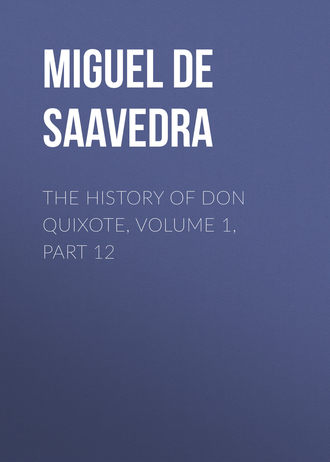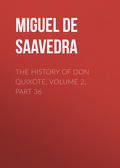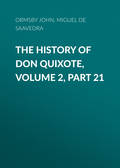
Мигель де Сервантес Сааведра
The History of Don Quixote, Volume 1, Part 12
CHAPTER XXX.
WHICH TREATS OF ADDRESS DISPLAYED BY THE FAIR DOROTHEA, WITH OTHER MATTERS PLEASANT AND AMUSING
The curate had hardly ceased speaking, when Sancho said, "In faith, then, senor licentiate, he who did that deed was my master; and it was not for want of my telling him beforehand and warning him to mind what he was about, and that it was a sin to set them at liberty, as they were all on the march there because they were special scoundrels."
"Blockhead!" said Don Quixote at this, "it is no business or concern of knights-errant to inquire whether any persons in affliction, in chains, or oppressed that they may meet on the high roads go that way and suffer as they do because of their faults or because of their misfortunes. It only concerns them to aid them as persons in need of help, having regard to their sufferings and not to their rascalities. I encountered a chaplet or string of miserable and unfortunate people, and did for them what my sense of duty demands of me, and as for the rest be that as it may; and whoever takes objection to it, saving the sacred dignity of the senor licentiate and his honoured person, I say he knows little about chivalry and lies like a whoreson villain, and this I will give him to know to the fullest extent with my sword;" and so saying he settled himself in his stirrups and pressed down his morion; for the barber's basin, which according to him was Mambrino's helmet, he carried hanging at the saddle-bow until he could repair the damage done to it by the galley slaves.
Dorothea, who was shrewd and sprightly, and by this time thoroughly understood Don Quixote's crazy turn, and that all except Sancho Panza were making game of him, not to be behind the rest said to him, on observing his irritation, "Sir Knight, remember the boon you have promised me, and that in accordance with it you must not engage in any other adventure, be it ever so pressing; calm yourself, for if the licentiate had known that the galley slaves had been set free by that unconquered arm he would have stopped his mouth thrice over, or even bitten his tongue three times before he would have said a word that tended towards disrespect of your worship."
"That I swear heartily," said the curate, "and I would have even plucked off a moustache."
"I will hold my peace, senora," said Don Quixote, "and I will curb the natural anger that had arisen in my breast, and will proceed in peace and quietness until I have fulfilled my promise; but in return for this consideration I entreat you to tell me, if you have no objection to do so, what is the nature of your trouble, and how many, who, and what are the persons of whom I am to require due satisfaction, and on whom I am to take vengeance on your behalf?"
"That I will do with all my heart," replied Dorothea, "if it will not be wearisome to you to hear of miseries and misfortunes."
"It will not be wearisome, senora," said Don Quixote; to which Dorothea replied, "Well, if that be so, give me your attention." As soon as she said this, Cardenio and the barber drew close to her side, eager to hear what sort of story the quick-witted Dorothea would invent for herself; and Sancho did the same, for he was as much taken in by her as his master; and she having settled herself comfortably in the saddle, and with the help of coughing and other preliminaries taken time to think, began with great sprightliness of manner in this fashion.
"First of all, I would have you know, sirs, that my name is-" and here she stopped for a moment, for she forgot the name the curate had given her; but he came to her relief, seeing what her difficulty was, and said, "It is no wonder, senora, that your highness should be confused and embarrassed in telling the tale of your misfortunes; for such afflictions often have the effect of depriving the sufferers of memory, so that they do not even remember their own names, as is the case now with your ladyship, who has forgotten that she is called the Princess Micomicona, lawful heiress of the great kingdom of Micomicon; and with this cue your highness may now recall to your sorrowful recollection all you may wish to tell us."
"That is the truth," said the damsel; "but I think from this on I shall have no need of any prompting, and I shall bring my true story safe into port, and here it is. The king my father, who was called Tinacrio the Sapient, was very learned in what they call magic arts, and became aware by his craft that my mother, who was called Queen Jaramilla, was to die before he did, and that soon after he too was to depart this life, and I was to be left an orphan without father or mother. But all this, he declared, did not so much grieve or distress him as his certain knowledge that a prodigious giant, the lord of a great island close to our kingdom, Pandafilando of the Scowl by name-for it is averred that, though his eyes are properly placed and straight, he always looks askew as if he squinted, and this he does out of malignity, to strike fear and terror into those he looks at-that he knew, I say, that this giant on becoming aware of my orphan condition would overrun my kingdom with a mighty force and strip me of all, not leaving me even a small village to shelter me; but that I could avoid all this ruin and misfortune if I were willing to marry him; however, as far as he could see, he never expected that I would consent to a marriage so unequal; and he said no more than the truth in this, for it has never entered my mind to marry that giant, or any other, let him be ever so great or enormous. My father said, too, that when he was dead, and I saw Pandafilando about to invade my kingdom, I was not to wait and attempt to defend myself, for that would be destructive to me, but that I should leave the kingdom entirely open to him if I wished to avoid the death and total destruction of my good and loyal vassals, for there would be no possibility of defending myself against the giant's devilish power; and that I should at once with some of my followers set out for Spain, where I should obtain relief in my distress on finding a certain knight-errant whose fame by that time would extend over the whole kingdom, and who would be called, if I remember rightly, Don Azote or Don Gigote."
"'Don Quixote,' he must have said, senora," observed Sancho at this, "otherwise called the Knight of the Rueful Countenance."
"That is it," said Dorothea; "he said, moreover, that he would be tall of stature and lank featured; and that on his right side under the left shoulder, or thereabouts, he would have a grey mole with hairs like bristles."
On hearing this, Don Quixote said to his squire, "Here, Sancho my son, bear a hand and help me to strip, for I want to see if I am the knight that sage king foretold."
"What does your worship want to strip for?" said Dorothea.
"To see if I have that mole your father spoke of," answered Don Quixote.
"There is no occasion to strip," said Sancho; "for I know your worship has just such a mole on the middle of your backbone, which is the mark of a strong man."
"That is enough," said Dorothea, "for with friends we must not look too closely into trifles; and whether it be on the shoulder or on the backbone matters little; it is enough if there is a mole, be it where it may, for it is all the same flesh; no doubt my good father hit the truth in every particular, and I have made a lucky hit in commending myself to Don Quixote; for he is the one my father spoke of, as the features of his countenance correspond with those assigned to this knight by that wide fame he has acquired not only in Spain but in all La Mancha; for I had scarcely landed at Osuna when I heard such accounts of his achievements, that at once my heart told me he was the very one I had come in search of."
"But how did you land at Osuna, senora," asked Don Quixote, "when it is not a seaport?"
But before Dorothea could reply the curate anticipated her, saying, "The princess meant to say that after she had landed at Malaga the first place where she heard of your worship was Osuna."
"That is what I meant to say," said Dorothea.
"And that would be only natural," said the curate. "Will your majesty please proceed?"
"There is no more to add," said Dorothea, "save that in finding Don Quixote I have had such good fortune, that I already reckon and regard myself queen and mistress of my entire dominions, since of his courtesy and magnanimity he has granted me the boon of accompanying me whithersoever I may conduct him, which will be only to bring him face to face with Pandafilando of the Scowl, that he may slay him and restore to me what has been unjustly usurped by him: for all this must come to pass satisfactorily since my good father Tinacrio the Sapient foretold it, who likewise left it declared in writing in Chaldee or Greek characters (for I cannot read them), that if this predicted knight, after having cut the giant's throat, should be disposed to marry me I was to offer myself at once without demur as his lawful wife, and yield him possession of my kingdom together with my person."
"What thinkest thou now, friend Sancho?" said Don Quixote at this. "Hearest thou that? Did I not tell thee so? See how we have already got a kingdom to govern and a queen to marry!"
"On my oath it is so," said Sancho; "and foul fortune to him who won't marry after slitting Senor Pandahilado's windpipe! And then, how illfavoured the queen is! I wish the fleas in my bed were that sort!"
And so saying he cut a couple of capers in the air with every sign of extreme satisfaction, and then ran to seize the bridle of Dorothea's mule, and checking it fell on his knees before her, begging her to give him her hand to kiss in token of his acknowledgment of her as his queen and mistress. Which of the bystanders could have helped laughing to see the madness of the master and the simplicity of the servant? Dorothea therefore gave her hand, and promised to make him a great lord in her kingdom, when Heaven should be so good as to permit her to recover and enjoy it, for which Sancho returned thanks in words that set them all laughing again.
"This, sirs," continued Dorothea, "is my story; it only remains to tell you that of all the attendants I took with me from my kingdom I have none left except this well-bearded squire, for all were drowned in a great tempest we encountered when in sight of port; and he and I came to land on a couple of planks as if by a miracle; and indeed the whole course of my life is a miracle and a mystery as you may have observed; and if I have been over minute in any respect or not as precise as I ought, let it be accounted for by what the licentiate said at the beginning of my tale, that constant and excessive troubles deprive the sufferers of their memory."







